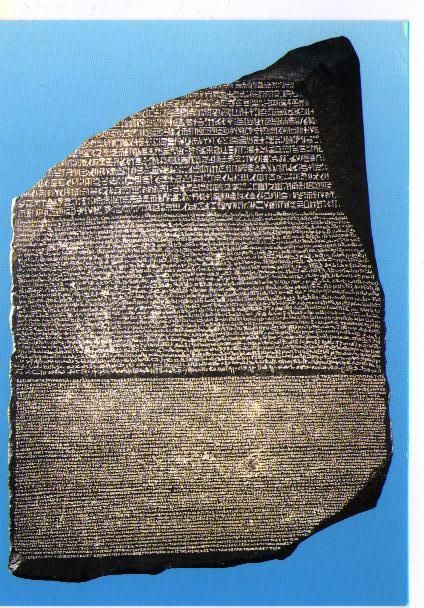
On this day in 1799, during Napoleon Bonaparte’s Egyptian campaign, a French soldier discovers a black basalt slab inscribed with ancient writing near the town of Rosetta, about 35 miles north of Alexandria. The irregularly shaped stone contained fragments of passages written in three different scripts: Greek, Egyptian hieroglyphics and Egyptian demotic. The ancient Greek on the Rosetta Stone told archaeologists that it was inscribed by priests honoring the king of Egypt, Ptolemy V, in the second century B.C. More startlingly, the Greek passage announced that the three scripts were all of identical meaning. The artifact thus held the key to solving the riddle of hieroglyphics, a written language that had been “dead” for nearly 2,000 years.
snip
Several scholars, including Englishman Thomas Young made progress with the initial hieroglyphics analysis of the Rosetta Stone. French Egyptologist Jean-Francois Champollion (1790-1832), who had taught himself ancient languages, ultimately cracked the code and deciphered the hieroglyphics using his knowledge of Greek as a guide. Hieroglyphics used pictures to represent objects, sounds and groups of sounds. Once the Rosetta Stone inscriptions were translated, the language and culture of ancient Egypt was suddenly open to scientists as never before.
The Rosetta Stone has been housed at the British Museum in London since 1802, except for a brief period during World War I. At that time, museum officials moved it to a separate underground location, along with other irreplaceable items from the museum’s collection, to protect in from the threat of bombs.
711 or 712 – Umayyad conquest of Hispania: Battle of Guadalete – Umayyad forces under Tariq ibn Ziyad defeat the Visigoths led by King Roderic.
1333 – Wars of Scottish Independence: Battle of Halidon Hill – The English win a decisive victory over the Scots.
1544 – Italian War of 1542: The Siege of Boulogne begins.
1545 – The Tudor warship Mary Rose sinks off Portsmouth.
1553 – Lady Jane Grey is replaced by Mary I of England as Queen of England after having that title for just nine days.
1588 – Anglo-Spanish War: Battle of Gravelines – The Spanish Armada sighted in the English Channel.
1692 – Salem Witch Trials: Five women are hanged for witchcraft in Salem, Massachusetts.
1701 – Representatives of the Iroquois Confederacy signed the Nanfan Treaty, ceding a large territory north of the Ohio River to England.
1832 – The British Medical Association was founded as the Provincial Medical and Surgical Association by Sir Charles Hastings at a meeting in the Board Room of the Worcester Infirmary.
1843 – Brunel’s steamship the SS Great Britain is launched, becoming the first ocean-going craft with an iron hull or screw propeller and also becoming the largest vessel afloat in the world.
1848 – Women’s rights: The two day Women’s Rights Convention opens in Seneca Falls, New York and the “Bloomers” are introduced at the feminist convention.
1863 – American Civil War: Morgan’s Raid – At Buffington Island in Ohio, Confederate General John Hunt Morgan’s raid into the north is mostly thwarted when a large group of his men are captured while trying to escape across the Ohio River.
1864 – Taiping Rebellion: Third Battle of Nanking the Qing Dynasty finally defeats the Taiping Heavenly Kingdom.
1870 – Franco-Prussian War: France declares war on Prussia.
1879 – Doc Holliday kills for the first time after a man shoots up his New Mexico saloon.
1912 – A meteorite with an estimated mass of 190 kg explodes over the town of Holbrook in Navajo County, Arizona causing approximately 16,000 pieces of debris to rain down on the town.
1916 – World War I: Battle of Fromelles – British and Australian troops attack German trenches in a prelude to the Battle of the Somme.
1919 – Following Peace Day celebrations marking the end of World War I, ex-servicemen rioted and burnt down Luton Town Hall.
1940 – World War II: Battle of Cape Spada – The Royal Navy and the Regia Marina clash; the Italian light cruiser Bartolomeo Colleoni sinks, with 121 casualties.
1940 – World War II: Army order 112 forms the Intelligence Corps of the British Army.
1942 – World War II: Battle of the Atlantic – German Grand Admiral Karl Dönitz orders the last U-boats to withdraw from their United States Atlantic coast positions in response to the effective American convoy system.
1963 – Joe Walker flies a North American X-15 to a record altitude of 106,010 metres (347,800 feet) on X-15 Flight 90. Exceeding an altitude of 100 km, this flight qualifies as a human spaceflight under international convention.
1964 – Vietnam War: At a rally in Saigon, South Vietnamese Prime Minister Nguyen Khanh calls for expanding the war into North Vietnam.
1976 – Sagarmatha National Park in Nepal is created.
1979 – The Sandinista rebels overthrow the government of the Somoza family in Nicaragua.
1983 – The first three-dimensional reconstruction of a human head in a CT is published.
1992 – Anti-Mafia Judge Paolo Borsellino is killed by a Mafia car bomb in Palermo, together with five police officers.

1 comments
Author